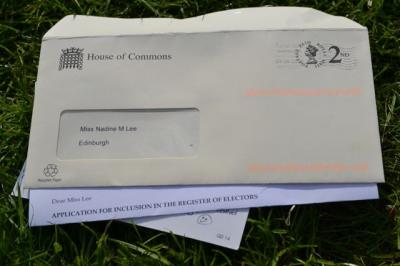Categories
Holyrood Perplexities - A Beginners Guide to Scottish Parliament
by Nadine Lee

It's an exciting time to be able to vote in Scotland – in September 2014 the country will go to the polls to decide on the Scottish Independence Referendum. This morning I received a delightful letter in the post from my local MP informing me that I am now registered to vote in the UK. Much to the annoyance of my fellow antipodean travelers, I'm incredibly fortunate that I have UK citizenship through my father who was born in London, thus enabling me to vote, live and work here visa-free.
I wanted to find out a little bit about the political system in Scotland, especially when tasked with having a say in the country's future on such a contentious issue. Feeling a little confused as to how the Scottish Parliament works alongside Westminster, I took a trip to the Scottish Parliament last week to find out more.
The Scottish Parliament is situated in the shadow of Arthur's Seat at the bottom of the Royal Mile in Edinburgh. On the day I visited a meeting of the Parliament was being held in the debating chamber, where SNP cabinet members for the Environment and Justice were questioned by other parties about their portfolios. This included questions and debates on reducing carbon emissions in Glasgow, amendments to the crofting reform act, assisting farmers affected by the recent cold weather and whether the Government is planning to reduce the number of Police Officers in order to meet budget cuts. An interesting question was also put forward regarding safeguarding the bee population of Scotland, to which much to my delight many bee-puns were given in response, (e.g. “I knew you would sting me with that question...”). The experience was entirely different to my visit to Westminster in November - The House of Commons is about five times smaller than the Scottish debating chamber, with UK MPs decidedly more ruckus.
The Scotland Act of 1998 established the first Parliament in Scotland since 1707. This passed power from Westminster to Holyrood on a range of devolved matters including health, education, housing, justice, the environment, agriculture and the arts. However Westminster still retained powers to make laws for Scotland on certain issues. These issues generally have a UK-wide or international impact and are known as reserved matters. They include things like benefits, immigration, defence, foreign policy, employment, broadcasting, nuclear energy and the Constitution.
The Scottish Parliament is made up of 129 elected representatives, who are known as Members of Scottish Parliament (MSPs). The voting system used is a type of proportional representation known as the Additional Member System, which gives each voter two votes in an election. The first vote is the constituency vote, with the candidate winning the largest number of votes gaining the seat. The second vote is for a political party within a larger electoral area called a Scottish Parliament region. In each of the eight regions, parties are allocated seats depending on the number of votes they receive in the regional ballot, and taking into account the number of constituency seats they win in a region. Of the 129 MSPs, 73 are constituency representatives, while 56 represent the eight parliamentary regions. In the last election in 2011, the Scottish National Party won 69 seats – making it a majority government. Previous governments were a minority government or coalition.
Bills passed by the Scottish Parliament don't have to be approved by the UK Parliament, however royal assent by The Queen must be given before they can come into force. In contrast the UK Parliament can pass laws that affect Scotland on devolved matters. By convention the UK Parliament would normally do this by seeking the consent of the Scottish Parliament through a legislative consent motion proposed by a MSP. It is possible for MSPs to become Members of the UK Parliament simultaneously (called a dual mandate), however the roles are entirely separate. There are 650 MPs in the House of Commons, 59 hailing from Scotland and representing Scotland on reserved matters.
During my afternoon in the debating chamber there was only one mention of the most hotly contested issue in Scotland at the moment – independence. The mention of this word by a SNP cabinet member made the debating chamber erupt into a fully fledged House-Of-Commons style debate, with MSPs from all parties crying out and waving papers and arms in the air when they disagreed. Scotland's Parliament surely does have an interesting year and a half ahead if the little snippet on independence I saw is anything to go by.
Topics:
Independece, politics, westminster, holyrood, parliament
Tweet
- May 7, 2013 9:11 pm
- ·
 Margaret Moffet and Donald like this.
Margaret Moffet and Donald like this.
Margaret Moffet
Another good piece by Nadine. Thank you!!
- May 10, 2013
- ·
- Like
- ·
- 1 person

